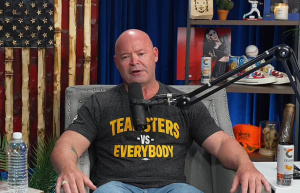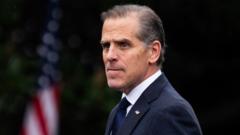Sean O'Brien, Teamsters president, accuses Democrats of neglecting their working-class roots, highlighting a significant withdrawal of union support for Kamala Harris's 2024 presidential campaign.
Teamsters President Criticizes Democratic Party Over Union Support

Teamsters President Criticizes Democratic Party Over Union Support
Teamsters leader Sean O'Brien rebukes Democrats, citing union discontent and shifting political allegiances.
In a striking criticism of his own political party, Teamsters president Sean O’Brien has taken aim at the Democratic Party, holding them accountable for losing crucial backing from one of the country's major labor unions. O’Brien's sharp comments were made after Vice President Kamala Harris, the party’s 2024 presidential nominee, failed to obtain the endorsement of the influential Teamsters union. This marks a notable break in tradition, as a Democratic candidate has always secured the union's support since 1996.
Appearing on Theo Von’s This Past Weekend podcast, O’Brien did not mince words. “I’m a Democrat, but they have f—ed us over for the last 40 years,” he declared, echoing a widening discontent within labor unions traditionally aligned with Democrats but experiencing shifting sentiments among their ranks.
Further criticizing the Democratic Party, O’Brien questioned their dedication to working-class Americans, citing a troubling involvement with corporate interests. “People say the Democratic Party is the party of the working people—they’re bought and paid for by Big Tech,” he affirmed, suggesting a departure from their foundational principles. This sentiment is corroborated by internal union surveys depicting that about 60% of Teamsters members are backing Donald Trump, the Republican contender, whereas only 34% support Harris.
For Harris, the absence of union endorsement is a critical setback, particularly given the historical symbiosis between Democrats and labor unions. Current polling underscores Harris’s difficulties among union households, a concern for Democratic leaders who refer to these findings as alarming developments in her campaign strategy.
O'Brien underscored that the onus is on the Democratic Party, not the union members. “And the Democrats, if 60 percent of our members aren’t supporting you, the f—ing system is broken, and you need to fix it. Stop pointing fingers at Sean O’Brien, stop pointing fingers at the Teamsters union. Look in the mirror.”
While the Teamsters have refrained from endorsing either presidential candidate for the upcoming election, their financial contributions paint an intriguing picture. Under O’Brien's leadership, the union has contributed $15.7 million to Democratic causes over the last two and a half years, in stark contrast to just $340,000 to Republicans. O’Brien’s outspoken comments indicate a deepening divide between organized labor and the Democratic agenda.
This discord is symptomatic of a broader political shift, with Republicans increasingly casting themselves as champions of the working class. O’Brien noted this trend, saying, “And you’ve got the Republicans who are now saying, ‘Hey, we want to be the working-class party,’ right? And, okay, you’ve got a great opportunity right now to do that.”
Facing these challenges, Harris’s campaign needs to swiftly rebuild its rapport with unions as labor support wanes. This challenge, coupled with dwindling enthusiasm among core Democratic constituencies, may significantly hinder the vice president’s 2024 election aims.
Appearing on Theo Von’s This Past Weekend podcast, O’Brien did not mince words. “I’m a Democrat, but they have f—ed us over for the last 40 years,” he declared, echoing a widening discontent within labor unions traditionally aligned with Democrats but experiencing shifting sentiments among their ranks.
Further criticizing the Democratic Party, O’Brien questioned their dedication to working-class Americans, citing a troubling involvement with corporate interests. “People say the Democratic Party is the party of the working people—they’re bought and paid for by Big Tech,” he affirmed, suggesting a departure from their foundational principles. This sentiment is corroborated by internal union surveys depicting that about 60% of Teamsters members are backing Donald Trump, the Republican contender, whereas only 34% support Harris.
For Harris, the absence of union endorsement is a critical setback, particularly given the historical symbiosis between Democrats and labor unions. Current polling underscores Harris’s difficulties among union households, a concern for Democratic leaders who refer to these findings as alarming developments in her campaign strategy.
O'Brien underscored that the onus is on the Democratic Party, not the union members. “And the Democrats, if 60 percent of our members aren’t supporting you, the f—ing system is broken, and you need to fix it. Stop pointing fingers at Sean O’Brien, stop pointing fingers at the Teamsters union. Look in the mirror.”
While the Teamsters have refrained from endorsing either presidential candidate for the upcoming election, their financial contributions paint an intriguing picture. Under O’Brien's leadership, the union has contributed $15.7 million to Democratic causes over the last two and a half years, in stark contrast to just $340,000 to Republicans. O’Brien’s outspoken comments indicate a deepening divide between organized labor and the Democratic agenda.
This discord is symptomatic of a broader political shift, with Republicans increasingly casting themselves as champions of the working class. O’Brien noted this trend, saying, “And you’ve got the Republicans who are now saying, ‘Hey, we want to be the working-class party,’ right? And, okay, you’ve got a great opportunity right now to do that.”
Facing these challenges, Harris’s campaign needs to swiftly rebuild its rapport with unions as labor support wanes. This challenge, coupled with dwindling enthusiasm among core Democratic constituencies, may significantly hinder the vice president’s 2024 election aims.





















